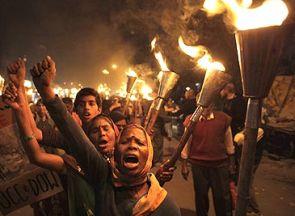
In the world's worst industrial disaster, the lethal methyl isocyanate gas had leaked on the intervening night of December 2-3, 1984 from the Union Carbide plant in the state capital leaving over 15,000 dead and around five lakh people injured.
At the meeting organised at the Yaadgar-E-ShahjahaniPark, the Bhopal Gas Peedit Mahila Udyog Sangathan said that it would file a petition in the Supreme Court for early hearing on payment of compensation to the gas victims.
"Our organisation would also approach the National Green Tribunal to seek compensation for the damage done to Bhopal by the disaster," Sangathan convenor Abdul Jabbar said on the occasion.
Jabbar also said that his organisation wanted the CBI to probe the alleged corruption that had taken place in relief and rehabilitation works for the gas victims.
"One of the biggest sore points with the victims is the fact that despite a disaster of such a magnitude, no one has so far been sent to jail," he said.
The Chief Judicial Magistrate of Bhopal had on June 7, 2010, sentenced a few persons in connection with the disaster but all of them were given bail within an hour of the judgement, he claimed.
The Bhopal Group for Information and Action took out a protest march carrying an effigy of Warren Anderson, former Chairman of the Union Carbide Corporation, and demanded that he be extradited to India for facing trial in the case.
After the meeting at Yaadgar-E-ShahjahaniPark, the members of the Bhopal Gas Peedit Mahila Udyog Sangathan formed a human chain in support of its demands.
Effigies of Anderson were also burnt in front of the Union Carbide's defunct plant.
At all the places where protests and meetings were held, it was said on behalf of the victims that neither the Centre nor the state government had done anything for them and both the Congress and BJP had made false promises to them.